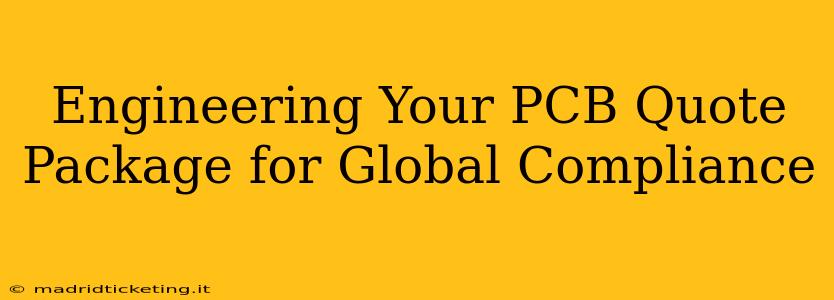Getting a Printed Circuit Board (PCB) manufactured can seem straightforward, but navigating the complexities of global compliance adds a significant layer of challenge. A well-engineered PCB quote package isn't just about price; it's about ensuring your product meets international standards, avoids costly delays, and protects your brand reputation. This comprehensive guide will walk you through the essential elements of creating a quote package that prioritizes global compliance.
What Makes a Compliant PCB Quote Package?
A compliant PCB quote package goes beyond simply listing the technical specifications of your board. It needs to proactively address potential compliance issues from the outset, minimizing risks and ensuring a smoother manufacturing process. Key elements include:
-
Detailed Bill of Materials (BOM): This isn't just a list of components; it needs to specify the exact part numbers, manufacturers, and compliance certifications (like RoHS, REACH, UL, etc.) for each component. Ambiguity here can lead to delays and costly substitutions.
-
Comprehensive Design Files: Provide complete and accurate Gerber files, along with any necessary 3D models or other documentation. Inconsistent or incomplete files are a major source of manufacturing errors and delays.
-
Clear Compliance Specifications: Explicitly state all relevant compliance standards your PCB must meet. This includes regional regulations (e.g., FCC, CE, CCC) and industry-specific standards. Don't assume the manufacturer knows your requirements—spell them out clearly.
-
Material Declarations: Clearly specify the materials used in your PCB, including substrate, solder mask, and any other relevant materials. This is crucial for compliance with RoHS, REACH, and other environmental regulations.
-
Manufacturing Process Specifications: Outline any specific manufacturing requirements, including surface finish, plating type, and testing procedures. This ensures consistent quality and compliance across the manufacturing process.
What are the Key Global Compliance Standards for PCBs?
Several key global standards impact PCB manufacturing and design. Understanding these is critical for creating a compliant quote package:
-
RoHS (Restriction of Hazardous Substances): This EU directive restricts the use of certain hazardous materials in electrical and electronic equipment. Your quote package needs to clearly specify RoHS compliance for all components and materials.
-
REACH (Registration, Evaluation, Authorisation and Restriction of Chemicals): Another EU regulation, REACH covers the registration, evaluation, authorization, and restriction of chemical substances. This impacts the materials used in your PCB and requires proper documentation.
-
UL (Underwriters Laboratories): UL certification is crucial for safety compliance in many markets, particularly North America. Your quote package should clearly state whether UL certification is required and specify the relevant standards.
-
CE Marking (Conformité Européenne): The CE mark indicates conformity with health, safety, and environmental protection legislation in the European Economic Area. This is a broad requirement encompassing various directives and regulations.
-
FCC (Federal Communications Commission): In the US, the FCC sets regulations for electronic devices to prevent radio frequency interference. If your PCB emits radio waves, FCC compliance is essential.
-
CCC (China Compulsory Certification): This is a mandatory certification for many products sold in China. Your quote package should specify if CCC certification is needed.
What are the potential consequences of non-compliance?
Ignoring global compliance standards can have severe repercussions:
-
Product Recalls: Non-compliant products can be recalled, leading to significant financial losses and reputational damage.
-
Legal Penalties: Violating regulations can result in hefty fines and legal action.
-
Market Access Restrictions: Non-compliant products may be barred from certain markets, limiting your sales potential.
-
Brand Damage: Compliance issues can severely damage your brand's reputation and trust with consumers.
How to Ensure Accurate Component Selection for Compliance?
Careful component selection is paramount. Use reputable component suppliers who provide detailed compliance information. Verify certifications and check for updated compliance statements before including components in your BOM.
How do I find a PCB manufacturer that understands global compliance?
Selecting a manufacturer with a proven track record of compliance is crucial. Look for manufacturers who are certified to relevant standards, have experience with various global regulations, and can provide documentation to support their compliance claims.
By meticulously addressing these points within your PCB quote package, you'll significantly improve the chances of a smooth, compliant manufacturing process and avoid potential pitfalls. Remember, proactive compliance isn't just a cost; it's an investment in the success and longevity of your product.

